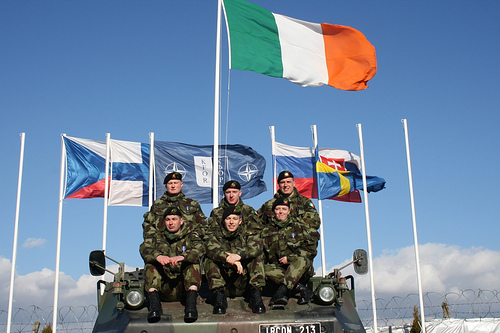Relations with Ireland
Ireland cooperates with NATO in a variety of areas, including peace-support operations. An important focus is to work together to develop military capabilities and improve the interoperability of the Irish armed forces with Allied and other partners’ armed forces in NATO, EU and UN-led missions.

- NATO fully respects Ireland’s longstanding policy of military neutrality, which allows for its armed forces to be used for peacekeeping and crisis management operations where there is a UN mandate, a government decision and parliamentary approval.
- Relations with Ireland began in 1997, when Ireland deployed personnel in support of the NATO-led peacekeeping operation in Bosnia and Herzegovina. Ireland has contributed to KFOR in Kosovo since 1999.
- In 1999, Ireland joined NATO’s Partnership for Peace (PfP) programme and the Euro-Atlantic Partnership Council, a multilateral forum for dialogue which brings together all Allies and partner countries in the Euro-Atlantic area.
- Cooperation between NATO and Ireland is governed by Ireland’s Individual Partnership and Cooperation Programme (IPCP), which is jointly agreed for a two-year period.
- Ireland contributes actively to a variety of PfP activities in areas such as generic planning for peacekeeping and peace support, operational procedures, logistics and training. The Irish Defence Forces also operate a UN peacekeeping school, which offers courses that are open to Allies and partners.
Key areas of cooperation
Ireland’s cooperation with NATO is mutually beneficial and includes:
Building capabilities and interoperability
- Ireland’s participation in the PfP Planning and Review Process (PARP) is aimed at enhancing the ability of the Irish Defence Forces to take part in multinational peace-support operations, including those led by the UN and EU. The PARP helps Ireland improve its capabilities and develop interoperability with Allies and other partners.
- Participation in the PARP also supports Ireland’s efforts to meet capability goals in the EU framework.
- Since 2014, under the Partnership Interoperability Initiative, Ireland has participated in the Interoperability Platform, which brings Allies together with selected partners that are active contributors to NATO’s operations.
Support for NATO-led operations and missions
- Ireland has contributed to the NATO-led Kosovo peacekeeping force (KFOR) since 1999.
- Irish staff officers and non-commissioned officers worked alongside Allied forces in Afghanistan from 2002 to 2016. Firstly, Ireland participated in NATO’s International Security Assistance Force (ISAF), which completed its mission at the end of 2014. Subsequently, Ireland was part of the follow-on Resolute Support Mission (RSM) until spring 2016 to further train, assist and advise the Afghan security forces.
Wider cooperation
- Ireland has contributed to a large number of NATO Trust Fund projects in other partner countries. These have included the destruction of mines in Montenegro and Serbia, the destruction of ammunition for small arms and light weapons in Albania, Montenegro, Serbia and Ukraine, and the removal of dangerous chemicals in the Republic of Moldova.
- Under the Science for Peace and Security (SPS) Programme, experts from Ireland have participated in numerous advanced research workshops addressing topics such as the use of internet for terrorist purposes and the Women, Peace and Security agenda. Upcoming activities will focus on the development of innovative technologies for chemical, biological, radiological and nuclear (CBRN) defence, and on advancing the understanding of nanomaterials and nanoarchitectures.
- Ireland has world-class expertise in countering improvised explosive devices (IEDs) and has provided its expertise through a number of programmes. Since 2010, the Irish Defence Forces Ordnance School has offered counter-IED training to Allies and partners. Since 2015, the school has also offered a course on countering marauding terrorist attacks (C-MTA), which provides counter-terrorism training to commanders from Allied and partner armed forces.
- Ireland has emphasised the importance of women’s participation in the conflict-resolution and peace-building process, and has helped many countries develop national action plans on the Women, Peace and Security (WPS) agenda. In 2016, Ireland hosted a NATO-sponsored conference on WPS implementation and continues to be very active in this domain within the Alliance.
